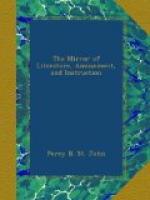But the contradictions circumstantial appear to (dis)advantage in the Literary Gazette, as will be seen among our quotations. The health of Burns being drunk “Both the sons of the poet standing up, the eldest expressed their gratitude for the tribute to their father’s genius.” The Gazette states the Shepherd’s health to have been prefaced by an “apt and interesting address,” but the Athenaeum represents the chairman to have “made sad work among the romances, &c.” Upon the health of the poets of England being drunk, Lord Porchester is stated in the Gazette to have spoken “eloquently in reply, and pronounced a beautiful eulogium upon the ameliorating effects produced upon individuals and communities by the cultivation of the Muses:” a very pretty subject for a school theme, to be sure, but unfortunate in comparison with the “titter of a hundred tongues” by which Lord Porchester is elsewhere stated to have been silenced.
“The toast of ‘Sir George Murray, and the military heroes of Scotland,’ called up that gallant officer, who addressed his applauding countrymen in a manner which seemed to be peculiarly grateful to their feelings. While he disclaimed it for his own humble services, he nobly awarded the laurel to his glorious companions in arms,—a Hopetoun, an Abercrombie, a Moore, and a Graham. He then mentioned his early recollection of Burns, whom he considered his father’s house to have been honoured by receiving within its walls; and playfully alluded to what the chairman had stated of his sister being the ‘Phemy’ of the poet,
“a
bonnier lass
Than braes of Yarrow ever saw;”
and expressed his hope, as every bard was in duty bound to maintain the peerless beauty of the fair whom he selected for his theme, that the Ettrick Shepherd (whose acquaintance he this night rejoiced to have made), would not be provoked to jealousy in consequence of this comparison above the beauties of Yarrow.”
After a few more toasts, the Gazette observes “the night was wearing late, and the rest of the proceedings were obliged to be hurried through in rather a tumultuous manner.” The unluckiest occurrence of all followed by Captain Basil Hall’s mention of the word “politics,” which “let slip the dogs of war,” or at least led to much confusion. This was explained away; but the Captain was “put out,” and “he was again unfortunate in attempting to pay a pleasant compliment, upon the excellence of his dinners, to Sir George Warrender, whose health was next drunk, in conjunction with the Scottish members of the legislature.—Sir George Warrender said he had no claim to have his name introduced on this occasion, and, however kindly intended, it had been done in a manner alike unexpected and painful to him. He came there as a Scotchman, proud to assist at a festival in honour of one of those eminent men who, in giving an imperishable fame to the poetry of Scotland, obtained for their country




